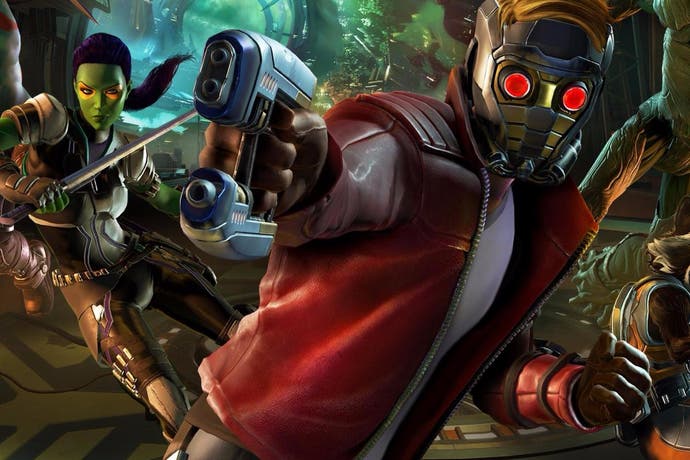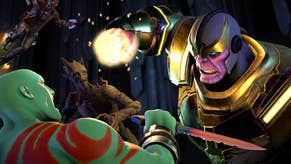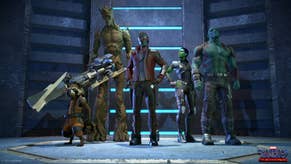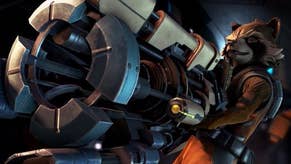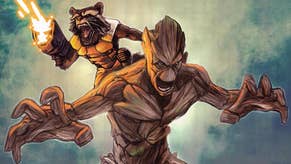Telltale's Guardians of the Galaxy gets off to a great start
Where there's a Quill…
Editor's note: The first episode of Telltale's Guardians of the Galaxy is out today on PS4, Xbox One, PC and mobile. We'll be looking to give you a full review once all five episodes have been released but for now here's our take on the series' opening.
Thanks to 2014's polychromatic splurge of a sci-fi blockbuster, the formerly C-list comic heroes known as the Guardians of the Galaxy (namely cocksure man-child Peter Quill aka Star-Lord, exasperated assassin Gamora, literal-minded legbreaker Drax, tetchy techno-ferret Rocket and tough son-of-a-beech Groot) are now bona-fide superstars.
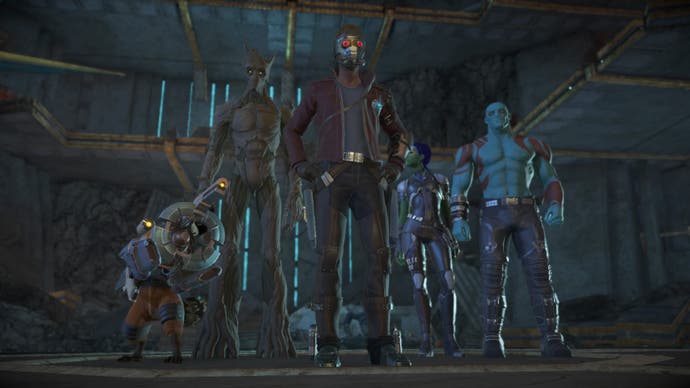
With a swaggering movie sequel practically screaming "come and get your love!" imminent, it feels like an opportune time for Telltale Games - past masters of crafting new stories out of licensed properties, then carving them up into downloadable chunks - to launch their own spin on the oddball space opera. Guardians of the Galaxy: The Telltale Series is the first in what could surely be a highly lucrative and potentially endless series of collaborations with Marvel. Presumably a lot is riding on this game: Groot expectations, indeed.
So how well does GotG, a property defined by widescreen intergalactic action incongruously soundtracked by classic 70s rock, slot into Telltale's now rather familiar template of point-and-click puzzle-solving, intermittent QTE sequences and conversation trees where your responses can have knock-on narrative consequences way down the line? The answer is: surprisingly well, and with more than a little help from ELO.
After downloading episode one, that's the first thing to greet you: a righteous blast of Jeff Lynne's pop genius in the form of Livin' Thing, combining a suitably curtain-raising flamenco trumpet fanfare with irresistible, upbeat sunniness. If Telltale's reputation-making Walking Dead games tended to skew dark, hearing this Smooth FM staple primes you for something a little more breezy. (It also helps put some clear Mr Blue Sky between GotG's colourful, cartoonish world and Telltale's recent stylised and moody Batman series.)
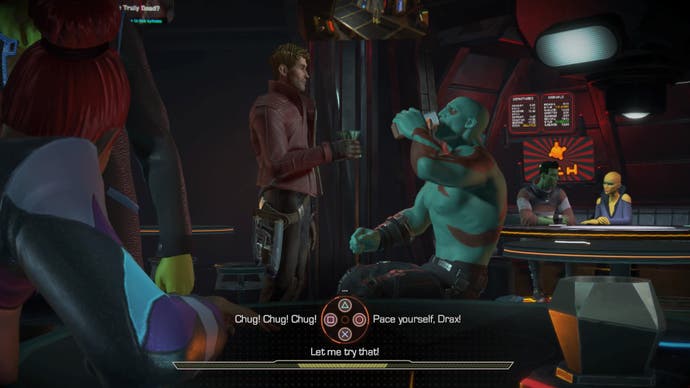
As well as wisely taking its soundtrack cues from James Gunn's movie, the game also lifts some key characterisations, signifiers and locations, including Quill's beloved, cluttered cruiser the Milano, the (largely ineffective) Nova Corps space police and Knowhere, that evocative hive of scum and villainy housed inside a long-dead cosmic titan's head. But there is leeway enough that Telltale can mess around with elements like crinkle-chinned purple bad dude Thanos and aggro alien race the Kree in ways that are not beholden to Marvel movie continuity. The adventure also begins with the dysfunctional Guardians gang already banded together - this, thankfully, is not yet another origin story.
Telltale's aim is to tell one overarching tale over five discrete chapters, each focusing on a different Guardian. It makes sense to start with self-appointed leader Peter Quill who, when his cool red-eyed Star-Lord faceplate dematerialises, looks like space Guybrush Threepwood and sounds a bit like young Christian Slater in his sarcastic imperial phase. With his dual-wield pistols and nifty jetboots, Quill is well-equipped to deal with both the requisite action QTEs and some split-level environmental puzzle-solving. Perhaps even more usefully, he allows players to experiment with some of the meaner, Mass-Effect-Renegade-esque dialogue choices without breaking the fiction or having to feel too bad because - let's face it - Star-Lord is kind of a dick.
The immensely useful choice of McGuffin - the Eternity Forge, a magical relic that provides a fuss-free way to spool, Walkman-style, back and forth through character's lives - helps explain some of the biographical speedbumps that shaped Quill's personality, and will presumably be employed to do the same for his fellow Guardians in subsequent chapters. This crosscutting between relived past and chaotic present also allows Telltale to showcase their expanding and increasingly refined range of storytelling techniques, employing accomplished montage, roaming cameras and witty edits to make Guardians of the Galaxy, appropriately, their most cinematic game to date.
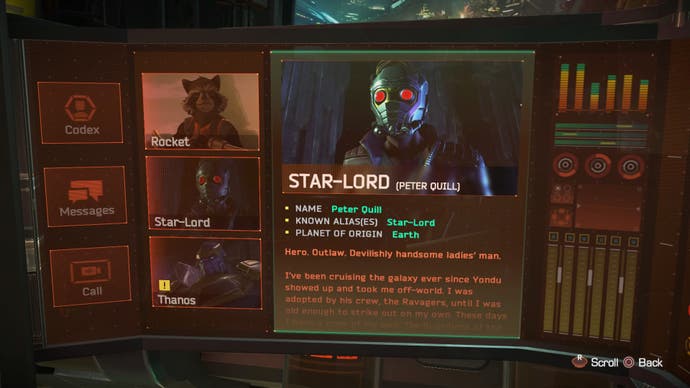
It probably helps that as well as sporadic space chases, all-out fisticuff rucks and panicky laser shootouts - all enhanced by notably well-integrated QTE prompts - some of the most absorbing sequences are essentially spent just mooching around, be it swapping gossip on the Milano or sinking lethal brews in a disreputable Knowhere dive called (rather amusingly to UK ears) Bar Bo'Lakks. Whatever the secret sauce is that has fuelled the success of the Guardians, camaraderie - or least needling interplay - seems a vital ingredient, and Telltale clearly understand this. Even when Star-Lord finds himself isolated from the group, he can noise them up on his com-link for added banter. The overall result is a vivid slice of sci-fi adventure, elevated further by some excellent voice acting.
With their bite-size episodes arriving with such regularity, it can be tempting to liken Telltale's expanding portfolio to an automated production line, sticking to an easily repeatable formula. A cynic might even suggest that the main reason Telltale games are split up into two-hour chunks is because if you played through a whole one in a single sitting you'd realise it lacked something: depth, variety or sophistication, maybe. But that would be nonsense.
There may be times where some of the narrative machinery is visible: QTEs where not hitting the button in time does not trigger a fail-state, conversations that will only ever have one conclusion whatever you say, nominally crucial decisions that might not have any tangible effect at all. But Telltale have, for the most part, continued to refine and perfect their techniques to the point that they reliably provide an immersive and enjoyable experience in a manageable timeframe for a small outlay. As well as expanding and blurring the boundaries of interactive storytelling, this is a valuable service for time-poor players looking for a good gaming hit, the sort of people who simply don't have 30 hours spare to haphazardly sink into Ghost Recon Wildlands.
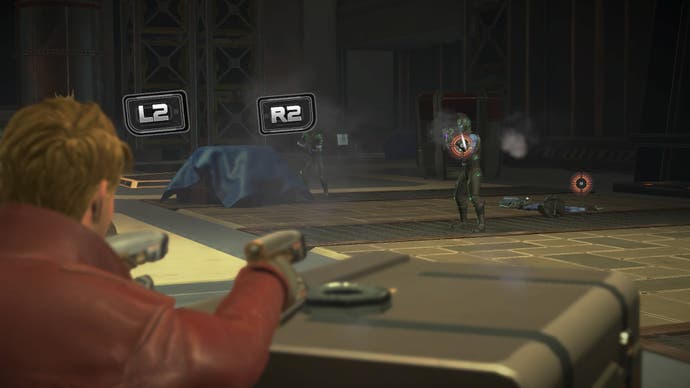
Telltale's recent Batman series set a reasonably high benchmark. While it could never realistically compete with the fluid, maximalist MMA combat and gothic orienteering of the Arkham franchise, it drilled deep into the duality of Batman/Bruce Wayne and came up with a distinctive take on Two-Face. Combined with a heavily-lined art style, it was enough for the game to carve out its own distinct identity amid the vast multi-media mythos of Bat-movies, comics and animated series: no mean feat.
Judging by the fleet, fun first instalment, Guardians of the Galaxy looks to be just as good. According to the download schedule, Groot won't get his time in the spotlight until the fifth and final instalment, an episode that promises a very different kind of branching conversation tree. And if Guardians of the Galaxy can successfully juggle its rotating cast with the ongoing Eternity Forge storyline it will likely set a new benchmark for Telltale. But then, when you have the frictionless yacht rock genius of Hall and Oates on your side, anything is possible.
